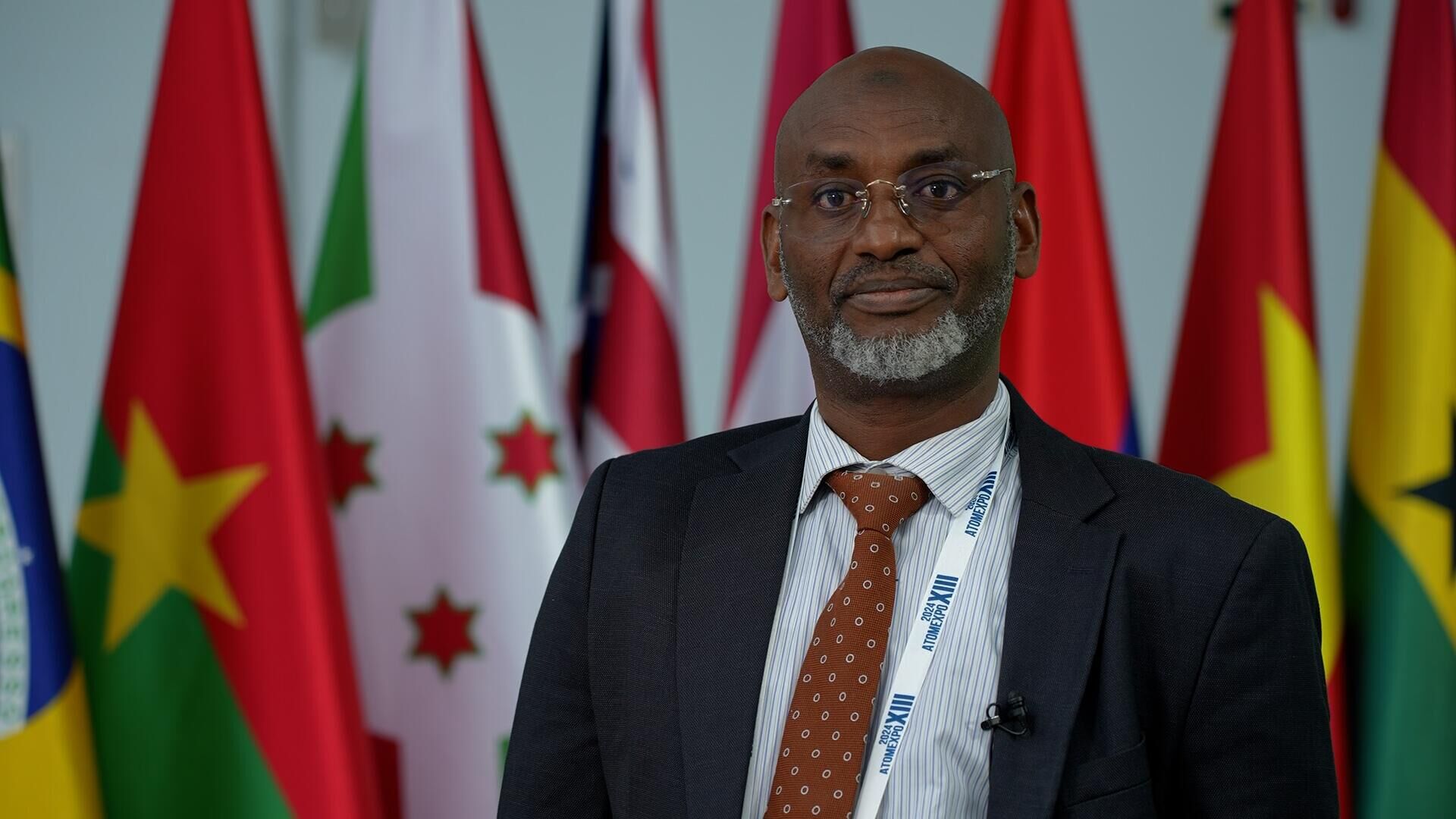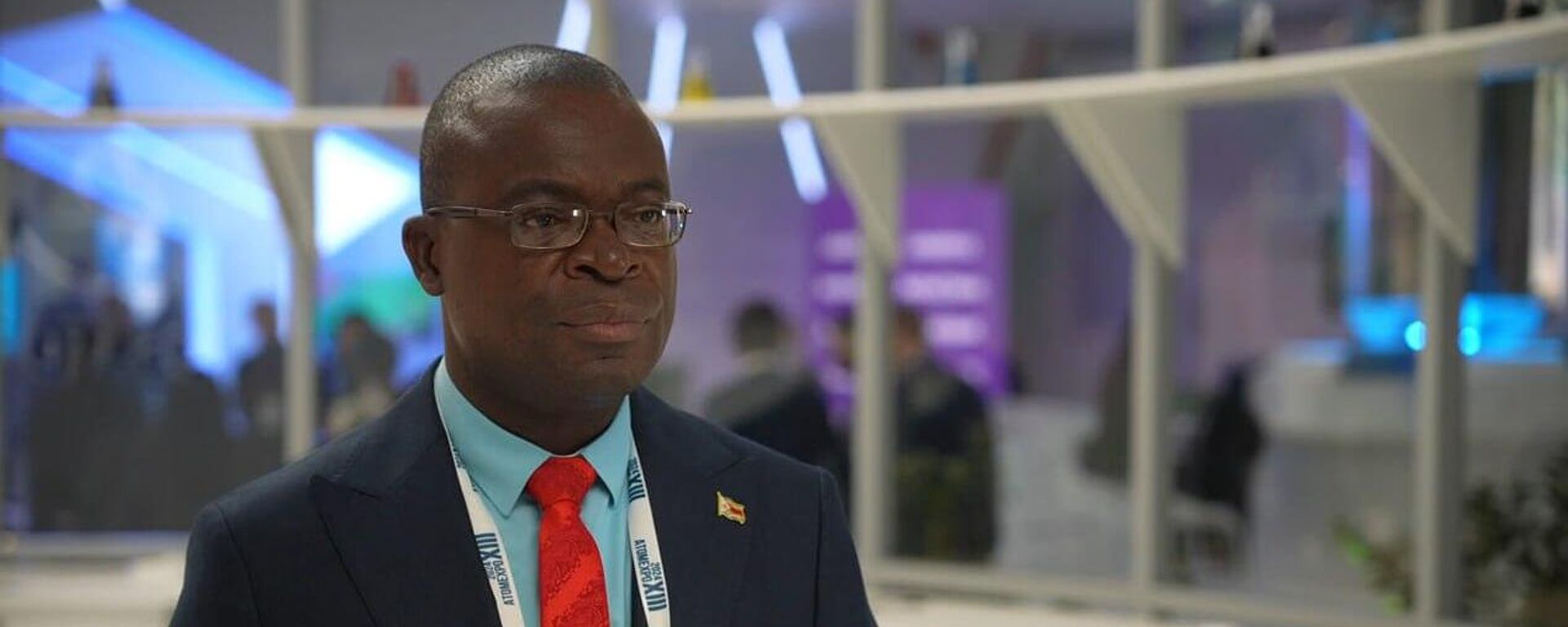https://en.sputniknews.africa/20240327/whats-the-status-of-npp-project-signed-by-burundi-with-rosatom-minister-explains-1065788887.html
What's the Status of NPP Project Signed by Burundi With Rosatom? Minister Explains
What's the Status of NPP Project Signed by Burundi With Rosatom? Minister Explains
Sputnik Africa
In late February, Head of Russia's state nuclear corporation Rosatom, Alexey Likhachev, said that the company has good prospects for cooperation with Africa... 27.03.2024, Sputnik Africa
2024-03-27T13:37+0100
2024-03-27T13:37+0100
2024-06-17T16:13+0200
opinion
russia-africa cooperation
burundi
russia
moscow
rosatom
east africa
nuclear energy
nuclear power plant (npp)
cooperation
https://cdn1.img.sputniknews.africa/img/07e8/03/1b/1065789271_0:0:1920:1080_1920x0_80_0_0_a8130d2831943bee7d4580f1745ecb2b.jpg
Burundi is currently waiting for a roadmap in order to accelerate the work on the nuclear power plant (NPP) project with Russia's state nuclear corporation Rosatom, Burundi's Minister of Hydraulics, Energy and Mines Ibrahim Uwizeye told Sputnik Africa.A nuclear power plant will launch Burundi into industrial production, Uwizeye said on the sidelines of the Atomexpo-2024 forum.Uwizeye noted that Burundi chose Moscow as a partner in this field because the Russians "were the first to actually develop it."The senior official went on to say that Burundi's soil is rich in raw materials ores, such as lithium, 3T (tin, tungsten, and tantalum), coltan, and cobalt. However, it takes "immense energy" to exploit them, he noted, adding that the nuclear power plant can really provide that.Today, the country generates more than 80% of its electricity from hydropower, the minister said. This network consists mainly of mini-plants, the capacity of which is not very high and therefore unattractive to investors, he stressed.According to the minister, his country's interest in civil nuclear energy is explained in particular by the fact that it is green energy that "does not destroy nature, [...] does not destroy biodiversity."As for other African nations, which strengthen partnership with Rosatom in the field of nuclear energy for peaceful purposes, in October Zimbabwe inked an agreement with the corporation in this regard.Moreover, at this year's Atomexpo, Mali and Burkina Faso signed cooperation roadmaps with Rosatom.Speaking about other aspects of nuclear cooperation, the minister noted that Burundi expects to develop nuclear medicine with the help of Russia.Thanks to this technology, the country will be able to treat its patients more effectively and save money, Uwizeye said.The introduction of nuclear medicine will, therefore, "benefit all Burundians and Africans in general," he assured.Commenting on the 2024 Atomexpo International Forum, the minister highlighted that the forumis "really useful for us, especially for Africans." In fact, more than 733 million people, including more than 640 million in Africa, do not have access to energy today, Uwizeye added.Atomexpo "showed us that nuclear energy will revolutionize the world tomorrow," he noted, adding that the forum makes it clear that "we really need to work with people [...] to have nuclear energy, as in Russia and other countries."The forum took place in Russian federal territory of Sirius on the Black Sea coast on March 25-26. The event brought together representatives of about 75 countries, setting a new record for the number of participating nations.
https://en.sputniknews.africa/20240326/future-of-clean-energy-is-nuclear-russia-helps-end-power-shortages-in-africa-zimbabwean-minister-1065780323.html
burundi
russia
moscow
east africa
Sputnik Africa
feedback@sputniknews.com
+74956456601
MIA „Rossiya Segodnya“
2024
Rasina Musallimova
https://cdn1.img.sputniknews.africa/img/07e7/0a/17/1063019139_0:0:646:646_100x100_80_0_0_348c74b69cf86748a53875f8148a2f85.jpg
Rasina Musallimova
https://cdn1.img.sputniknews.africa/img/07e7/0a/17/1063019139_0:0:646:646_100x100_80_0_0_348c74b69cf86748a53875f8148a2f85.jpg
News
en_EN
Sputnik Africa
feedback@sputniknews.com
+74956456601
MIA „Rossiya Segodnya“
Sputnik Africa
feedback@sputniknews.com
+74956456601
MIA „Rossiya Segodnya“
Rasina Musallimova
https://cdn1.img.sputniknews.africa/img/07e7/0a/17/1063019139_0:0:646:646_100x100_80_0_0_348c74b69cf86748a53875f8148a2f85.jpg
russia-africa cooperation, burundi, russia, moscow, rosatom, east africa, nuclear energy, nuclear power plant (npp), cooperation, africa in details
russia-africa cooperation, burundi, russia, moscow, rosatom, east africa, nuclear energy, nuclear power plant (npp), cooperation, africa in details
What's the Status of NPP Project Signed by Burundi With Rosatom? Minister Explains
13:37 27.03.2024 (Updated: 16:13 17.06.2024) Exclusive
In late February, Head of Russia's state nuclear corporation Rosatom, Alexey Likhachev, said that the company has good prospects for cooperation with Africa. He also noted that a number of African countries had approached the company to consider projects for the construction of new nuclear power plants (NPPs) on their territory.
Burundi is currently waiting for a roadmap in order to accelerate the work on the nuclear power plant (NPP) project with Russia's state nuclear corporation Rosatom, Burundi's Minister of Hydraulics, Energy and Mines Ibrahim Uwizeye told Sputnik Africa.
A nuclear power plant will launch Burundi into industrial production, Uwizeye said on the sidelines of the Atomexpo-2024 forum.
"I hope that with the agreements we have with Rosatom, there is a way to achieve this," he noted.
Uwizeye noted that Burundi chose Moscow as a partner in this field because the Russians "were the first to actually develop it."
The senior official went on to say that Burundi's soil is rich in
raw materials ores, such as lithium, 3T (tin, tungsten, and tantalum), coltan, and cobalt. However, it takes "immense energy" to exploit them, he noted, adding that the nuclear power plant can really provide that.
Today, the country generates more than 80% of its electricity from hydropower, the minister said. This network consists mainly of mini-plants, the capacity of which is not very high and therefore unattractive to investors, he stressed.
According to the minister, his country's interest in civil nuclear energy is explained in particular by the fact that it is green energy that "does not destroy nature, [...] does not destroy biodiversity."
As for other African nations, which
strengthen partnership with Rosatom in the field of nuclear energy for peaceful purposes, in October Zimbabwe inked an agreement with the corporation in this regard.
Moreover, at this year's Atomexpo, Mali and Burkina Faso signed cooperation
roadmaps with Rosatom.
Speaking about other aspects of nuclear cooperation, the minister noted that Burundi expects to develop nuclear medicine with the help of Russia.
Thanks to this technology, the country will be able to treat its patients more effectively and save money, Uwizeye said.
"Certainly, we have people who have cancer. When they get cancer, we give them currency so that they can be treated abroad. Since we do not produce currency, dollar currency, you understand that this is difficult," the senior official stressed.
The introduction of nuclear medicine will, therefore, "benefit all Burundians and Africans in general," he assured.
Commenting on the 2024
Atomexpo International Forum, the minister highlighted that the forumis "really useful for us, especially for Africans." In fact, more than 733 million people, including more than 640 million in Africa, do not have access to energy today, Uwizeye added.
Atomexpo "showed us that
nuclear energy will revolutionize the world tomorrow," he noted, adding that the forum makes it clear that "we really need to work with people [...] to have nuclear energy, as in Russia and other countries."
The forum took place in Russian federal territory of Sirius on the Black Sea coast on March 25-26. The event brought together representatives of about 75 countries,
setting a new record for the number of participating nations.



